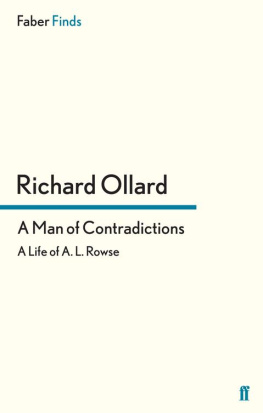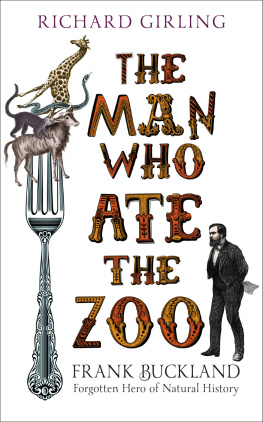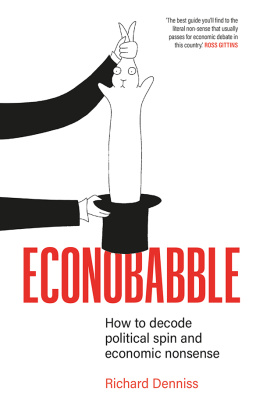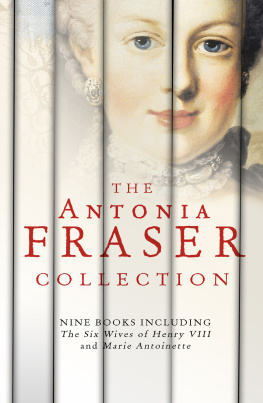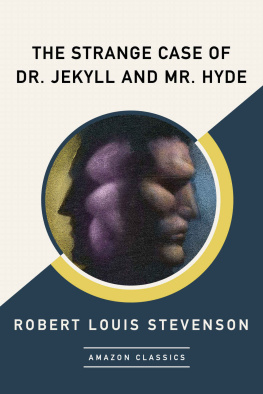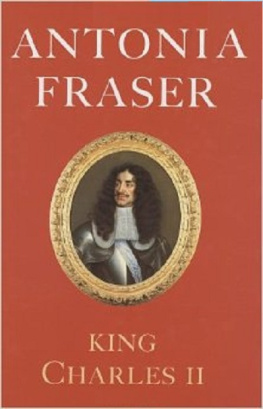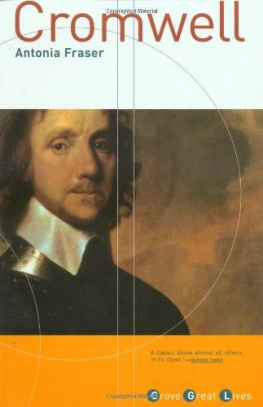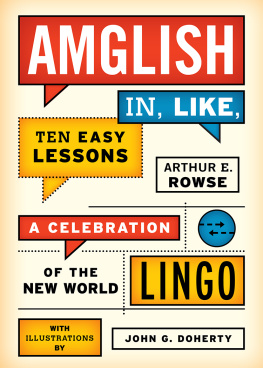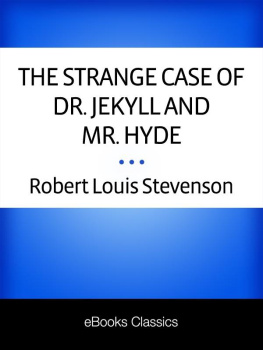This biography is based largely on A. L. Rowses personal archive which he presented, two or three years before his death, to the Library of the University of Exeter. When I was invited to write his life I made two stipulations: first, that nothing I wrote on the subject should appear during his lifetime and second, that I should be granted exclusive access to all his books and papers until after my book had been published. Rowse, who had several times expressed the wish that no biography of him should be written, nevertheless agreed at once to these conditions . He further presented me with a great deal of material (he had not yet made his gift to the University of Exeter) and welcomed my visits to discuss its contents and, indeed, to range at will over his long life.
The disorder of the papers (he kept, it sometimes seems, everything, even Christmas cards, but made only fitful efforts to sort and to arrange) meant that if I was to get on with the job I could not afford to wait for what was bound to be a long undertaking. The papers had been piled into boxes and files which were numbered, so that in taking notes and transcribing I had the rough means of citation necessary for my own reference but useless to future researchers when the papers will have been properly classified and arranged. Thus to facilitate reference I have tried to indicate by date and description the documentary authority for statements deriving from this my principal source. Other sources are cited in the usual manner in the footnotes.
It will be seen that I had the advantage, unknown to a biographer whose work has been largely in the seventeenth century, of conversing with my subject. The kindness of his contemporaries and friends has been no less valuable. The late Lord Sherfield, who was Rowses contemporary at Christ Church and was elected to a Fellowship at All Souls on the same day, and the late Sir Isaiah Berlin, elected only a few years later, both allowed me to come and question them. So did his colleagues of a younger generation, Sir Raymond Carr and Sir Michael Howard. The chaplain of the College, Professor McManners, and the ex Codrington Librarian, J. S. G. Simmons, the closest friends of his last years at All Souls, have been unfailingly helpful.
In Cornwall the hospitality of Lord and Lady St Levan at St Michaels Mount and that of David Treffry at the great house from which his family have for centuries commanded Fowey harbour introduced me to two of the Countys splendours dearest to Rowses heart. His near contemporary and sometime solicitor Mr John Pethybridge supplied me with invaluable recollections of the circumstances of Rowses early life.
I wish to express my thanks to Tim Farmiloe and John Handford at Messrs Macmillan and to Mrs J. C. Sen at the John Rylands University Library, Manchester for searching their archives on my behalf. In America I wish to record my obligation to the Library of the University of Georgia at Athens (to which Rowse sold part of his library) where I was shown much kindness by Mary-Ellen Brooks, and to the Huntington Library at Pasadena, especially to its distinguished senior scholars, J. M. Steadman, Andrew Rolle and Robert Wark, who allowed me to profit from their memories of Rowses visits.
In Shakespearean matters Miss Mary Edmond, Mr Stephen Freer and Professor Stanley Wells have generously put their scholarship at my disposal. Elizabeth Jenkins, in Rowses opinion his most rewarding correspondent, has kindly supplied me with letters of hers which are not in the Rowse archive. My old friend Kenneth Rose has allowed me to quote from his Diary whose future publication is eagerly awaited.
Mr Sydney Cauveren has saved me much labour by permitting me to avail myself of his A. L. Rowse bibliography which is shortly to be published in America by the Scarecrow Press. Mr John Saumarez Smith of Heywood Hill Books, the purchaser of Rowses library, has drawn my attention to much that I would have missed. For the assistance and considerate attention of the Exeter University Librarian, Dr Alasdair Paterson, and his staff over many months I am deeply grateful.
Finally to Rowses oldest and closest friends, Jack Simmons, Norman Scarfe, David Treffry, and Raleigh Trevelyan my debt is limitless. Their friendship and encouragement have irradiated the writing of this book.
For permission to quote from T. S. Eliots letters in the Rowse archive I am most grateful to his widow, Mrs Valerie Eliot. The letter from George Bernard Shaw is printed by permission of the Society of Authors on behalf of the Bernard Shaw estate.
Richard Ollard
Cornwall, the Little Land as A. L. Rowse, one of its most distinguished sons, thought of it, is like a tender towed in the wake of Britain. It is a tongue of land, seventy miles long and rarely more than twenty miles broad, buffeted to the north by the crashing seas of the Atlantic, indented to the south by the deep bays and estuaries of the Channel coast, sharing with Brittany a Celtic and a maritime inheritance that sets them apart from the great countries to which they have long been attached. Unlike the other large historic English counties it exudes no evidence of wealth. There are no smiling, fat, landscapes. Its beauties are either big, bare, dramatic, as most of its grand coastline or its central moors, or hidden, intimate valleys. It is not at all English. A fierce poverty, a fierce independence, are its human characteristics.
Alfred Leslie Rowse, born on 4 December 1903, in the hamlet of Tregonissey, on the hillside above St Austell in which it is now absorbed, proudly recalled that it like all the china-clay villages of the Higher Quarter, escaped the stifling embrace of the squirearchy. And that fact, I realize now, though it was never thought of then, had a profound effect on our upbringing and social outlook. We were an independent folk; we never saw anybody in the village better than ourselves. I never remember seeing any sign of servility among any of its inhabitants. We were not in the habit of saying sir to anybody. I cannot recall my father saying sir to anyone; nor did the china-clay workers as a whole, any more than, I suppose, the free and independent tinners from whom they sprang had done in their day.
The tin mines to which he alludes, and in which his grandfather had worked, had been for centuries, perhaps even from Phoenician times, the chief source of such natural wealth as the county could boast. The mining tradition it fostered enabled Cornishmen to seek their fortunes in the Gold Rushes in South Africa, Australia and California when the tin diminished. (It had finally given out a year or two after Rowses death.) But it was succeeded in the nineteenth century by the china-clay industry, in which his father was employed, that still flourishes in the part of southern Cornwall in which he was born, lived and died.
Cornwall is now, to most English people except those who go there for seaside holidays (again like Brittany), as remote as Greenland. It is on the way to nowhere. It is an end in itself (as Rowse would passionately have wished it to be and as, for him, it always was). In The Seven Landscapes of Cornwall he describes the contrasts and particularities of its landscape, concluding with his own:
What about the corrugated lunar landscape of the St Austell china-clay country in the moonlight, under snow? I once saw an auroraborealis up there on a snowy day, over a thousand feet up.

